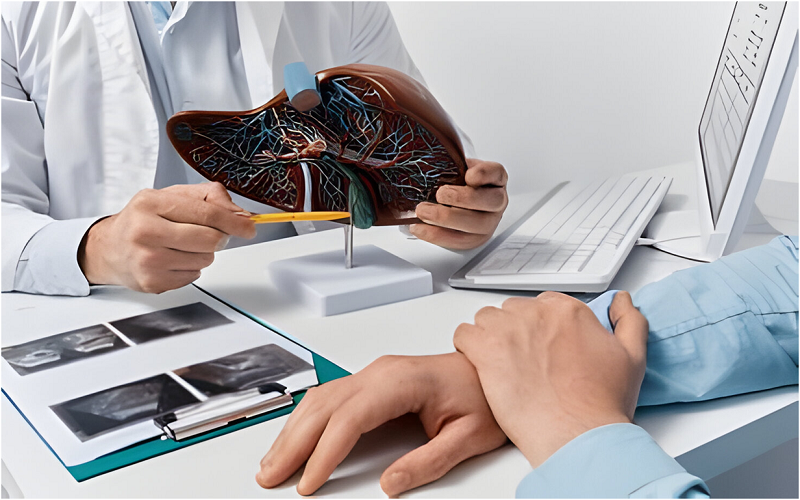Find 10 Surprising Facts About Liver You Didn’t Know
The liver is one of the most vital organs in the human body, yet many people are unaware of its multifaceted roles. It’s not just a simple filter; the liver is a powerhouse of biochemical processes. Here are ten surprising facts about the liver that you might not know, shedding light on liver function, liver anatomy, liver infection, liver ailments, and tips on how to make liver healthy.
Want to know more about how the liver functions, and how you can keep it in top working order? Visit a super-speciality hospital in Lucknow today.
The Human Body’s largest internal organ: The Liver
The liver is the largest internal organ in the human body, weighing approximately 3 pounds in adults. It is located in the upper right portion of the abdomen, beneath the diaphragm and above the stomach. This impressive organ is crucial for numerous bodily functions, including detoxification, protein synthesis, and the production of biochemicals necessary for digestion.
It Can Regenerate Itself
One of the most astonishing aspects of liver anatomy is its ability to regenerate. Even if up to 75% of the liver is removed, it can grow back to its full size. This regenerative capacity is essential for liver function, allowing it to recover from damage and maintain its critical roles in the body. This unique feature is vital for liver transplants and surgeries, making recovery and adaptation much smoother.
The Liver Processes Nutrients
After you eat, nutrients from your food are absorbed into your bloodstream and travel to the liver. The liver processes these nutrients, converting them into forms that your body can use. This includes converting excess glucose into glycogen for storage, breaking down fats, and synthesising proteins. This crucial liver function helps maintain the body’s metabolic balance.
It Plays a Key Role in Blood Clotting
The liver produces several important proteins involved in blood clotting, a vital process that prevents excessive bleeding when injuries occur. Without these proteins, even minor cuts could result in significant blood loss. Liver ailments that impair this function can lead to serious bleeding disorders.
The Liver Filters Toxins from the Blood
One of the liver’s primary roles is detoxification. It filters toxins from the blood, including alcohol, drugs, and harmful byproducts of metabolism. These toxins are then converted into less harmful substances or expelled from the body through urine or bile. Liver function tests often assess how well the liver is performing this critical task.
Liver Infections are More Common Than You Think
Liver infections, such as hepatitis, are more prevalent than many people realise. Hepatitis can be caused by viruses (hepatitis A, B, and C), excessive alcohol consumption, and certain medications. These infections can lead to inflammation and significant liver damage if left untreated. Understanding the signs of liver infection and seeking early medical intervention is crucial for maintaining liver health.
It Stores Vitamins and Minerals
The liver stores various essential vitamins and minerals, including vitamins A, D, E, K, and B12, as well as iron and copper. These nutrients are released into the bloodstream as needed, helping to ensure that the body’s metabolic processes run smoothly. This storage function highlights the liver’s role in maintaining overall nutritional balance.
The Liver Produces Bile
Bile is a digestive fluid that is produced by the liver in our bodies. Without bile, fats would be indigestible, leading to nutritional deficiencies. Bile also carries waste products from the liver to be excreted from the body. This dual role in digestion and waste elimination is a testament to the liver’s complex and essential functions.
Liver Ailments Can Be Silent Killers
Many liver ailments, such as fatty liver disease, cirrhosis, and liver cancer, can progress without obvious symptoms until they are quite advanced. This makes regular screening and liver function tests vital, especially for individuals at higher risk due to factors like obesity, diabetes, or excessive alcohol consumption. Early detection can help massively with the treatment outcomes
How to make liver healthy
Liver health has a notable role to play in maintaining the overall health and well-being of the human body. Implements and steps for how to make liver healthy involve consuming a balanced diet that includes the necessary nutrients, exercising and adhering to a fitness routine on a daily basis, staying hydrated, getting vaccinated, and going for regular check-ups at a super-speciality hospital in Lucknow are some of the main steps that can help maintain liver health and performance.
In Conclusion
The liver is an extraordinary organ with a wide array of functions vital to maintaining overall health. From its impressive regenerative capabilities to its central role in detoxification, nutrient processing, and blood clotting, the liver’s importance cannot be overstated. Awareness of liver infection risks and liver ailments, coupled with proactive measures like visiting a super-specialityhospital in Lucknow, can significantly enhance liver health and overall well-being. Understanding these surprising facts about liver anatomy and function underscores the need to protect and maintain this vital organ for a healthier life.



